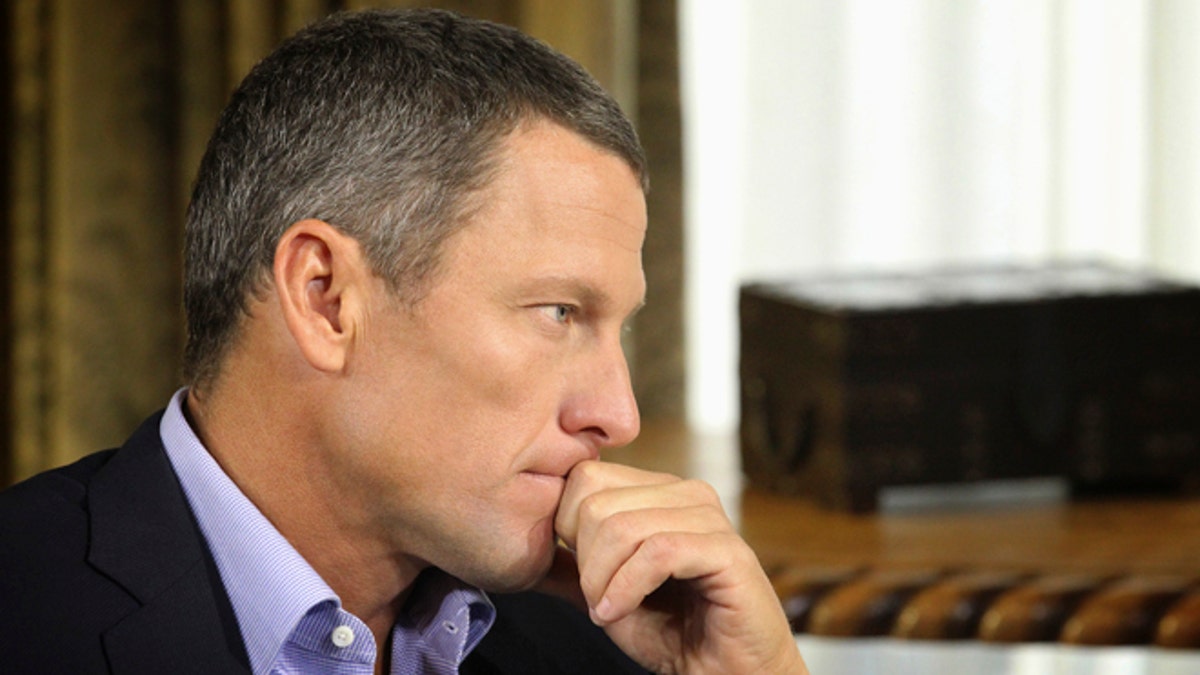
In this Monday, Jan. 14, 2013, file photo provided by Harpo Studios Inc., Lance Armstrong listens as he is interviewed by talk show host Oprah Winfrey during taping for the show "Oprah and Lance Armstrong: The Worldwide Exclusive" in Austin, Texas. (AP/Harpo Studios, Inc.)
Just days after coming clean to Oprah Winfrey about cheating his way to cycling immortality, Lance Armstrong remains one of the “most recognizable and admired people” of his era, according to his personal website.
Armstrong, 41, admitted to Winfrey last week that he used performance-enhancing drugs throughout his record-breaking streak of seven Tour de France titles, but you wouldn't know it from looking at the glowing bio on his website. The version there is the one much of the world stopped buying years ago, and the remaining holdouts gave up on last week.
“If scripted by Hollywood, the story would be dismissed as trite melodrama: A deadly disease strikes a promising athlete. Despite desperately thin odds, he manages not only to beat the affliction but also to return to the sport and win its top prize, not once but a record seven times,” the website reads. “Unbelievable, except it's true.”
The three-paragraph biography on LanceArmstrong.com, which was noticed by ESPN’s Rachel Nichols on Tuesday, also cites Armstrong’s place within the cancer community.
“Just how much nerve does Lance Armstrong have?” Nichols tweeted.
“But the story doesn't end on the finish line at the Tour de France,” the website continues. “His experience made him a part of a cancer community, and motivated him to unleash the same passion and drive he does in bike races to the fight against cancer.
“Since he made history in 1999, he has won the tour six more times, and has become one of the most recognizable and admired people of this era.”
Messages seeking comment from Armstrong's representatives were not immediately returned Tuesday.
Meanwhile, the panel investigating links between cycling's governing body and Armstrong has postponed its first hearing because of snow in London. The International Cycling Union's independent commission will now hold its procedural hearing in London on Friday. The three-person panel will consider whether to introduce an amnesty or truth and reconciliation commission to persuade riders to come forward with doping information without fear of retribution.
The panel is investigating accusations that UCI leaders covered up suspicious doping tests given by Armstrong during his 1999-2005 run of Tour de France victories and unethically accepted donations from him totaling $125,000.
Armstrong, during last week’s interview with Winfrey, said he finally cracked after he saw his son defending him against allegations from anti-doping authorities. He didn't break over the $75 million in lost sponsorship deals, or after being forced to walk away from the Livestrong cancer charity he founded. And he didn't crack after his lifetime ban from competition.
"I saw my son defending me and saying, `That's not true. What you're saying about my dad is not true,"' Armstrong recalled.
"That's when I knew I had to tell him."
The Associated Press contributed to this report.
